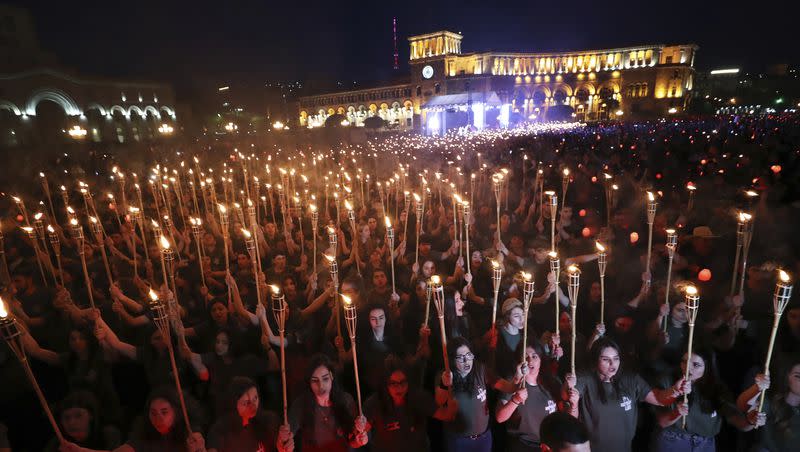Opinion: Today is Armenian Genocide Remembrance Day

- Oops!Something went wrong.Please try again later.
“Turkey is taking advantage of the war in order to thoroughly liquidate its internal foes, i.e., the indigenous Christians, without being thereby disturbed by foreign intervention. What on earth do you want? The question is settled. There are no more Armenians.” — Talat Pasha, in a conversation with Dr. Mordtmann of the German Embassy in June 1915.
On April 24, 1915, the authorities of the Ottoman Empire (modern-day Turkey), began rounding up and killing Armenian intellectuals and community leaders in Constantinople. From there, the systematic attempt at eradicating all ethnic Armenians spread across the country and included mass executions and forced starvation of 1.5 million Armenians, out of 1.8 million who were living in the area at the time. The remaining 300,000 or so fled or were deported, resulting in one of the “greatest diasporas in the 20th century,” as penned by the University of Minnesota College of Liberal Arts.
Some 80 years later, one of the great-great-grandchildren of the diaspora joined our family via Russian adoption. Our daughter’s DNA profile shows her to be nearly 50% Armenian and Turkish.
As with all genocides, the victims were dehumanized and stripped of basic human rights before the killings began. Laws were passed allowing the new Turkish government to deport anyone they “sensed” was a security threat. Another one allowed the confiscation of “abandoned” Armenian property and another required Armenians to turn in their weapons, including former members of the military who were then worked to death in labor camps.
Armenians were executed via sword, shooting, burning, torture, gas and poison. Reports circulated of children being loaded onto boats, taken out to sea and thrown overboard. Many Armenians not executed in mass killings were forcibly marched to their deaths, being sent through the Syrian desert without food or water. Rape was commonplace, as were forced marriages.
Related
Biden formally acknowledges WWI killing of Armenians as ‘genocide’
Is there an opportunity for Utah in Armenia? A conversation with Ambassador Lilit Makunts
The Armenian genocide, the first genocide of the 20th century, was also the origin of the word “genocide” and its codification in international law. The term “genocide” was coined by Polish lawyer Raphäel Lemkin, who was horrified at the newspaper stories of what was happening to the Armenians. It consists of the Greek prefix genos, meaning race or tribe, and the Latin suffix cide, meaning killing and was first recognized under international law in 1946. In 1948, it was codified by the United Nations. Since that time, it has been ratified by 152 countries, with the U.S. signing on in 1988.
It wasn’t until 2021 when President Joe Biden issued the nation’s first official statement calling what happened in Armenia a “genocide.” Why the delay? Foreign policy experts and political insiders say the primary reason was the desire to preserve the U.S.-Turkey relationship, as Turkey continues to steadfastly deny that a genocide occurred. Turkey does acknowledge that “atrocities” occurred.
No one was ever held responsible.
Holly Richardson is the editor of Utah Policy. Her doctoral studies included a minor in international relations.

